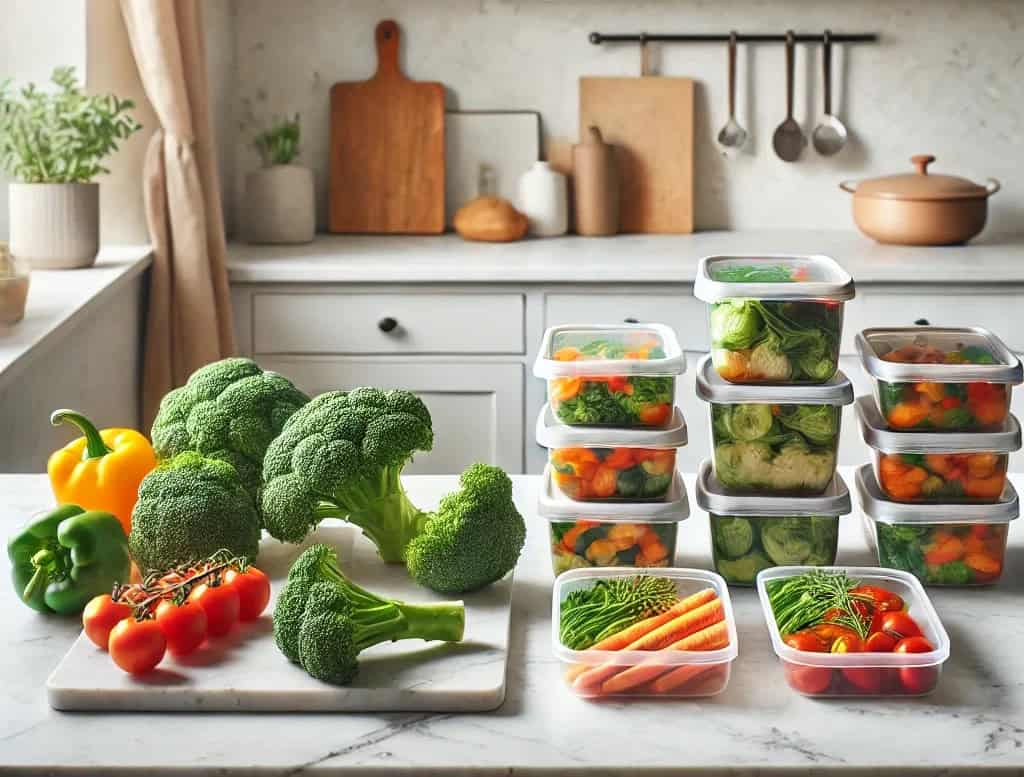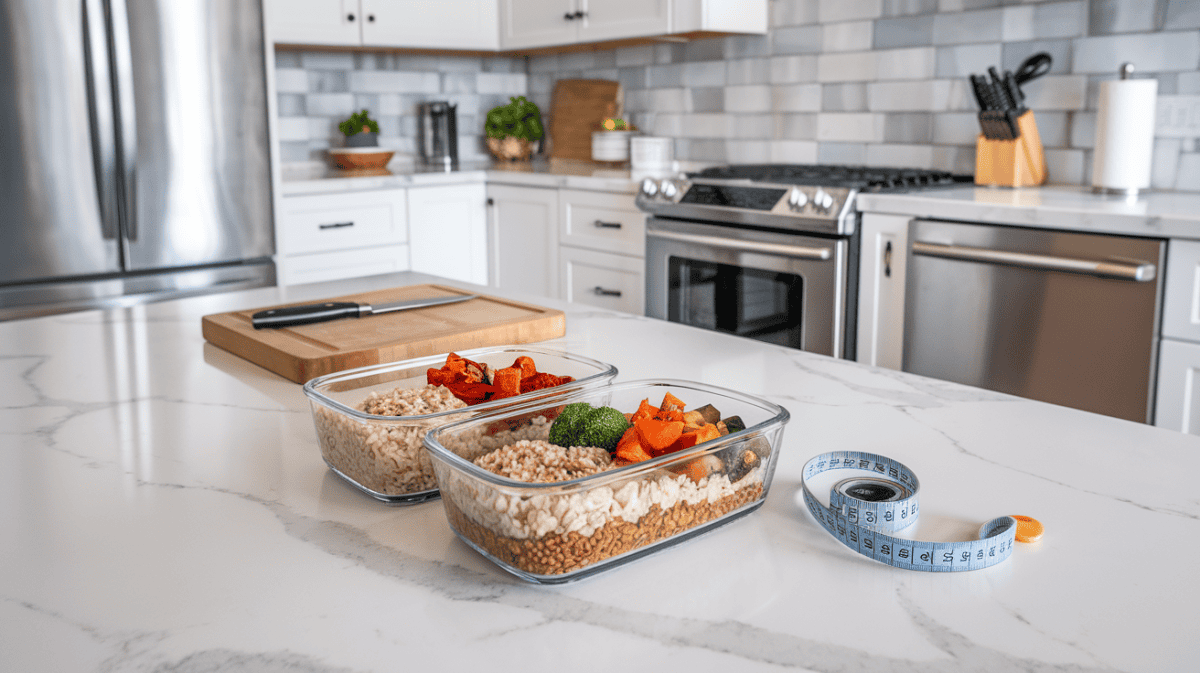Imagine waking up feeling energized, your digestion smooth and effortless, and your meals leaving you satisfied instead of sluggish. What if the secret to better digestion, glowing skin, and balanced energy levels wasn’t some complicated health hack—but simply the foods you eat?
Science confirms it: your gut microbiome—the trillions of bacteria living in your digestive system—plays a critical role in your immunity, mood, and overall health. According to Harvard Health Publishing, 70% of immune cells reside in the gut, and disruptions in gut bacteria can even affect your mood and brain function.
I saw this firsthand when my daughter had to take a round of antibiotics for a sinus infection. While the medication worked, it also wiped out the beneficial bacteria in her gut. Suddenly, she was feeling more tired than usual, and her digestion was off. That’s when I started focusing on gut-nourishing, plant-based meal prep to help her recover—and I was shocked by how much better we both started to feel.
If you’ve ever struggled with bloating, low energy, or digestion issues, it may be time to take a closer look at your gut health. In this post, I’ll break down how simple, plant-based meal prep strategies can help you balance your microbiome, plus share easy-to-prep gut-friendly foods and recipes.
Why Gut Health Matters
Your gut isn’t just responsible for digestion—it’s the command center for your overall health. At the heart of it all is the gut microbiome, a community of trillions of bacteria and other microorganisms living in your digestive tract. These tiny helpers do everything from breaking down food and extracting nutrients to supporting your immune system and even influencing your mood.
A balanced microbiome helps you feel energetic, aids regular digestion, and keeps bloating at bay. However, when it’s disrupted—due to illness, poor diet, or antibiotics—you might experience fatigue, irregular digestion, or even brain fog. What’s more, the gut is deeply connected to the immune system, with up to 70% of immune cells located in the gut. This makes caring for your gut essential for both preventing illness and recovering from it.
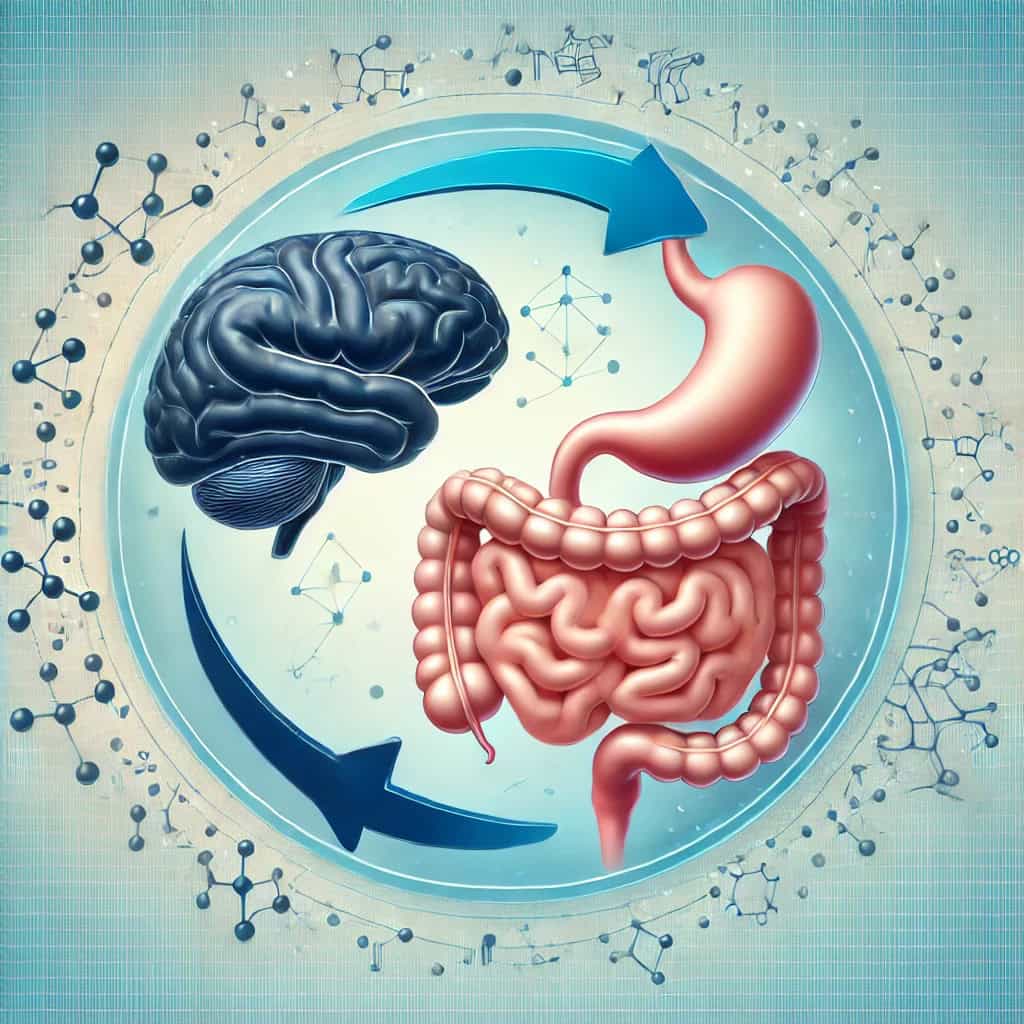
Even more surprising? Your gut and brain communicate through the gut-brain axis. Disruptions in the microbiome can impact mood, and imbalances have been linked to conditions like anxiety and depression. Gut bacteria play a key role in producing serotonin—the “feel-good chemical” that helps regulate mood. After a round of antibiotics, for instance, it’s common to feel emotionally low as the gut’s delicate balance is disrupted.
The good news? Small dietary changes can make a big difference. A plant-based diet, rich in fiber-packed fruits, vegetables, legumes, and whole grains, acts as a prebiotic—fueling the good bacteria in your gut. Incorporating fermented foods like miso and kimchi adds probiotics to replenish beneficial bacteria. Together, these foods help nurture your microbiome and support a healthier, happier you.
How Does A Plant-Based Diet Promotes Gut Health
When it comes to supporting gut health, the foods you eat play a starring role. A plant-based diet is packed with ingredients that nourish your gut microbiome, keeping it balanced and thriving. Here are some key categories of gut-friendly foods to incorporate into your meal prep, along with a breakdown of how they work their magic.
Gut Health Foods That Make Your Insides Happy
Your diet is one of the most powerful tools for building a healthy gut. Thankfully, a plant-based lifestyle is packed with foods that help your microbiome thrive. Let’s break it down into categories to make it easy to incorporate them into your meals.
High-Fiber Foods
Fiber is your gut bacteria’s favorite fuel. Think of it as the all-you-can-eat buffet they need to stay active and balanced. Some top fiber-rich options include:
- Lentils: Perfect for soups, stews, or even salads, lentils are rich in both soluble and insoluble fiber, helping keep digestion smooth.
- Chickpeas: Whether you’re roasting them for snacks or blending them into hummus, chickpeas deliver a hearty dose of gut-loving fiber.
- Quinoa: This gluten-free grain is not just a fiber powerhouse—it’s also a complete protein, which can support gut repair.
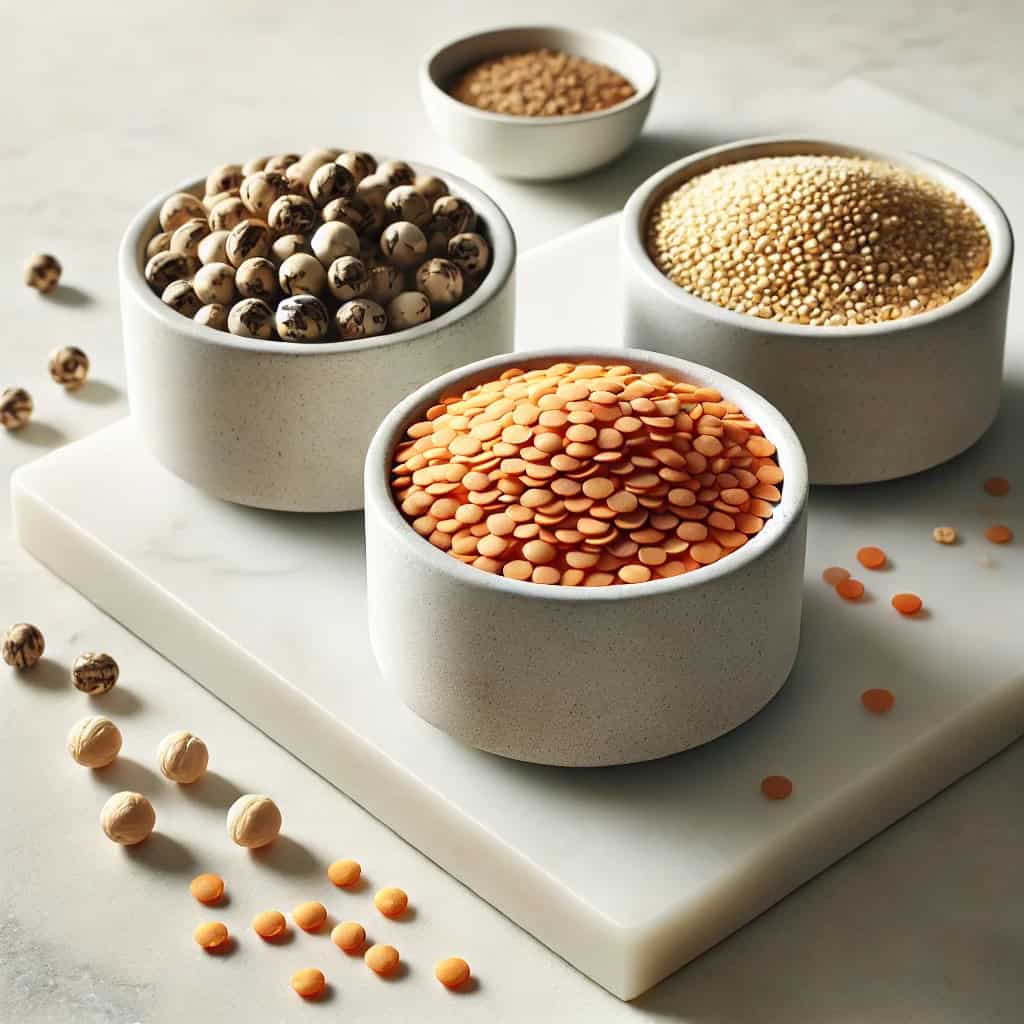
Probiotic-Rich Foods
Probiotics are the live bacteria that support a diverse, balanced microbiome. Adding these foods to your meals is a flavorful way to give your gut a boost:
- Kimchi: This spicy, fermented veggie mix isn’t just delicious—it’s loaded with beneficial bacteria.
- Miso: Stir miso into soups or dressings to add probiotics while keeping your meals flavorful and comforting.
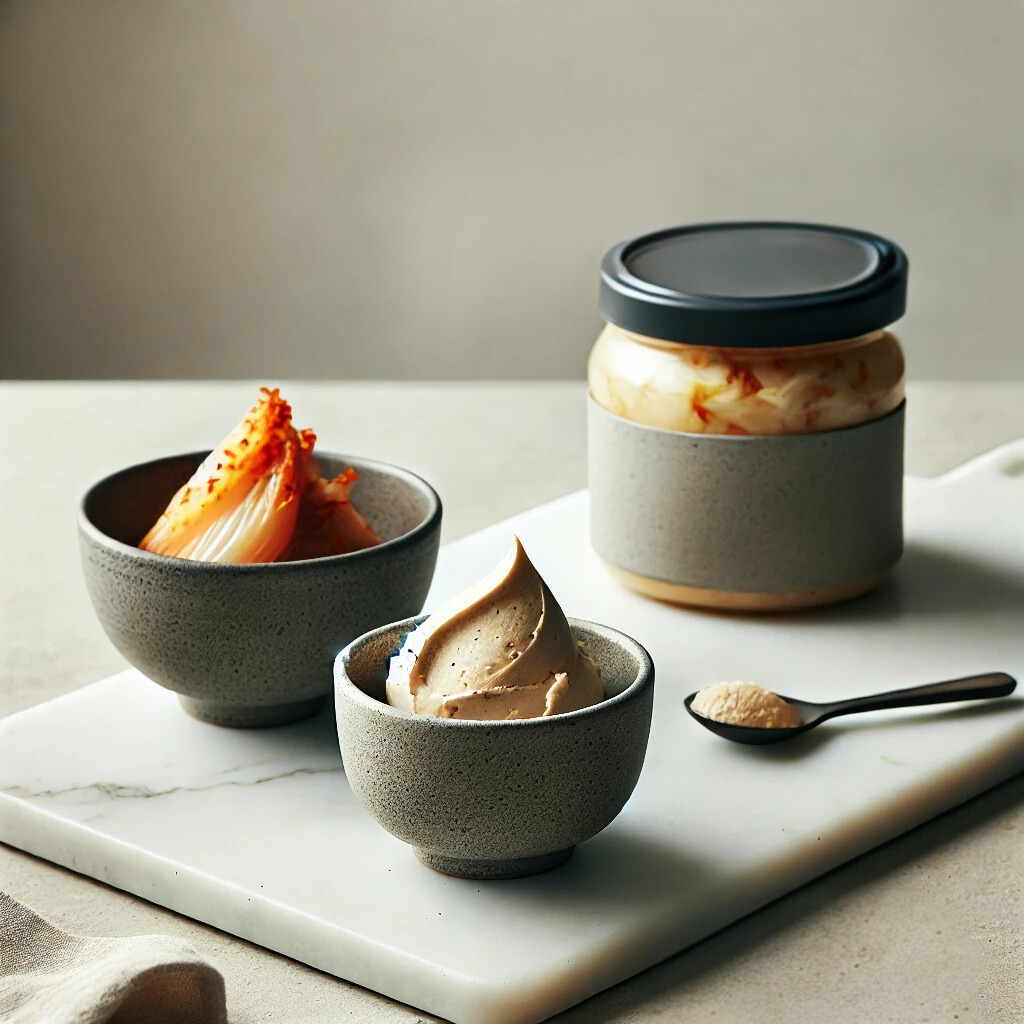
Prebiotic-Rich Foods
Prebiotics are a type of fiber that acts as food for probiotics, helping them grow and thrive. They’re essential for a balanced gut microbiome and can be found in:
- Garlic: A potent prebiotic that also has natural antibacterial properties.
- Onions: Versatile and flavorful, onions are easy to add to almost any meal while feeding your good bacteria.
- Asparagus: This veggie is rich in inulin, a type of prebiotic fiber that supports gut health and regularity.
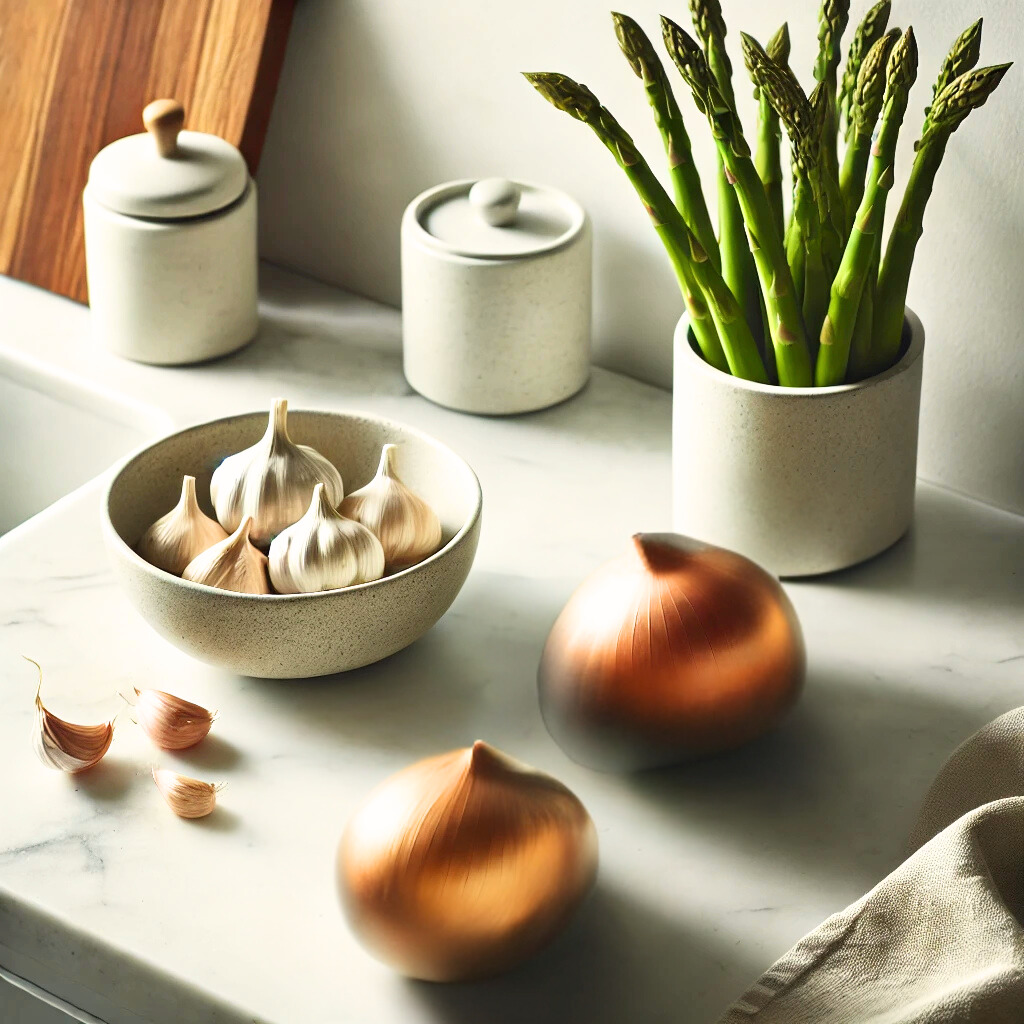
Prebiotics vs. Probiotics: What’s the Difference?
Understanding the difference between prebiotics and probiotics is key to building a gut-friendly diet:
- Prebiotics: Think of these as the “fertilizer” for your gut. They’re non-digestible fibers found in foods like garlic, bananas, and onions that fuel the growth of good bacteria.
- Probiotics: These are the live bacteria that populate your gut and help maintain its balance. You’ll find them in fermented foods like kimchi, sauerkraut, and miso.
When combined, prebiotics and probiotics work as a team to support your digestive system. Prebiotics feed probiotics, helping them multiply and thrive, which in turn keeps your gut microbiome diverse and balanced. It’s a perfect partnership!
By incorporating these plant-based, gut-loving foods into your diet, you’re giving your microbiome the tools it needs to flourish. The best part? These ingredients are easy to prep, versatile, and delicious—making it simple to prioritize gut health foods in every meal.
If you’re looking for an even easier way to enjoy gut-friendly meals, some companies offer meal prep kits designed with digestive health in mind. Check out 5 Best Plant-Based Meal Prep Kits for Beginners to explore options that simplify meal prep while nourishing your microbiome.
Easy Plant-Based Recipes for a Healthy Gut
When it comes to gut health, simplicity and flavor go hand in hand. These easy, plant-based recipes are not only packed with nutrients but also designed to support your gut microbiome. From fiber-filled breakfasts to probiotic-rich snacks, here’s how you can make gut-friendly eating both delicious and practical.
Breakfasts
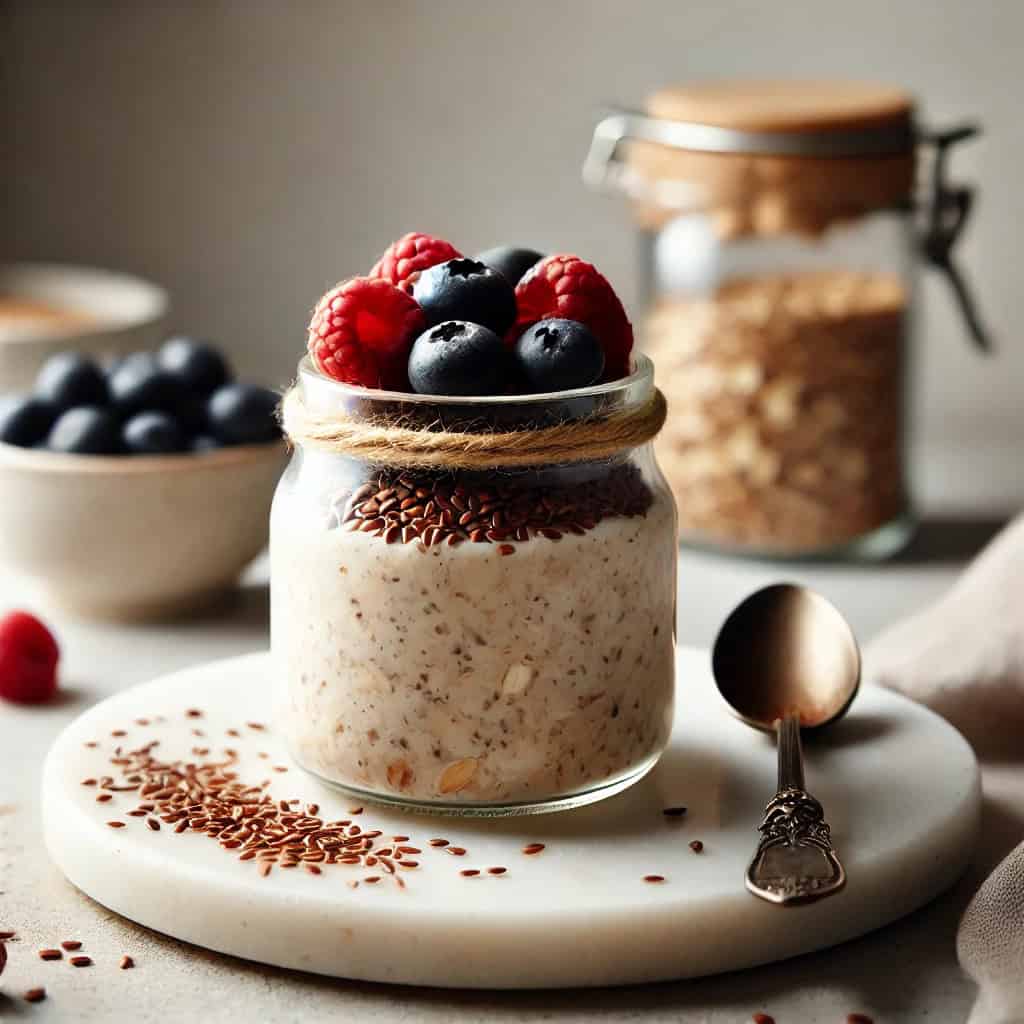
Overnight Oats with Flaxseeds and Berries
Start your day with a fiber-packed bowl of overnight oats. Combine rolled oats, plant-based milk, a tablespoon of flaxseeds, and your favorite berries in a jar, then let it sit in the fridge overnight. The oats provide prebiotic fiber, while flaxseeds add omega-3s that reduce inflammation and support gut health. Berries, rich in antioxidants, give your microbiome a boost while adding natural sweetness.
Probiotic-Rich Miso Veggie Soup
Who says soup is only for lunch or dinner? A light miso veggie soup made with a base of miso paste, baby spinach, and soft tofu is a comforting and probiotic-packed way to start your day. Just stir in the miso paste after the soup has cooled slightly to preserve its live cultures.
Lunches
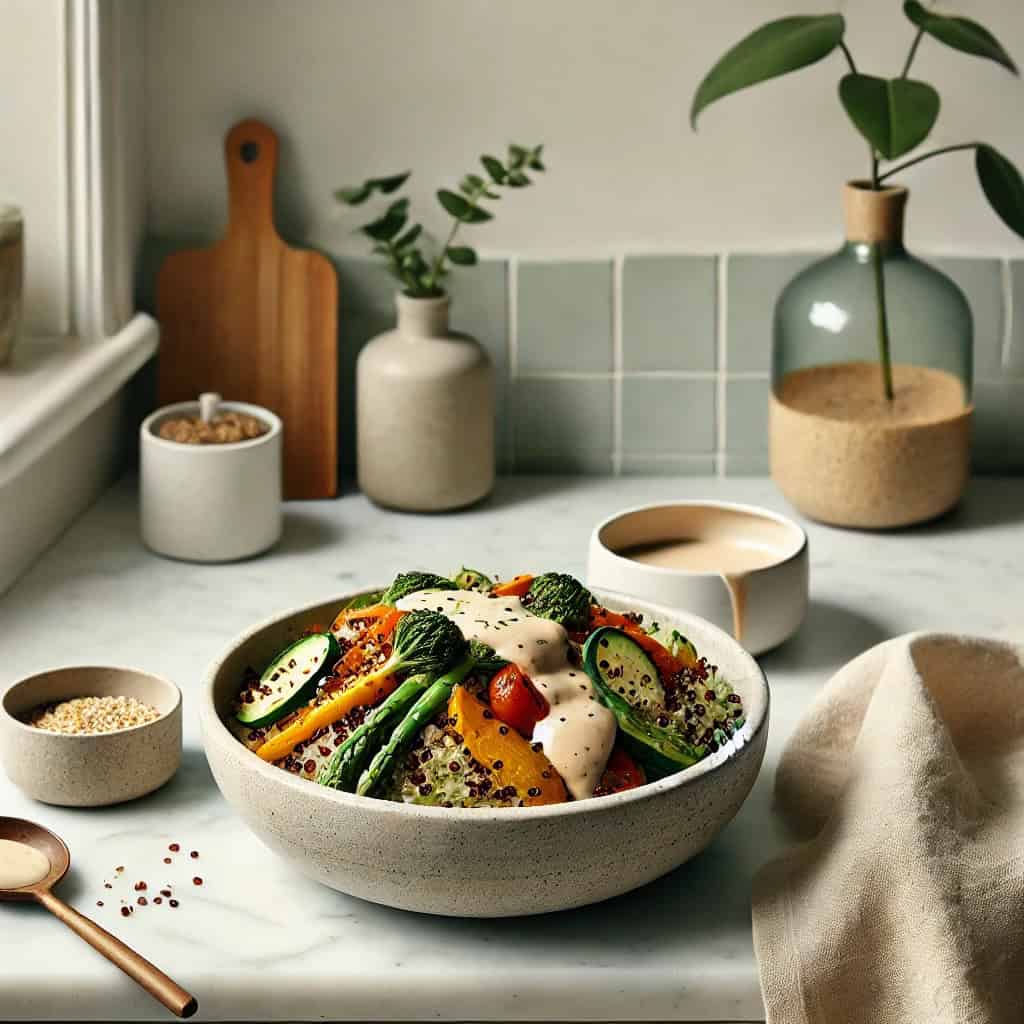
Quinoa Salad with Roasted Vegetables and Tahini Dressing
This vibrant, nutrient-packed salad is a gut-health superstar. Quinoa offers a complete protein and plenty of fiber, while roasted vegetables like zucchini, carrots, and bell peppers bring prebiotic goodness to the mix. Drizzle with a creamy tahini dressing for a dose of healthy fats that support digestion and absorption of nutrients. Plus, this salad keeps well, making it perfect for healthy meal prep.
Dinners
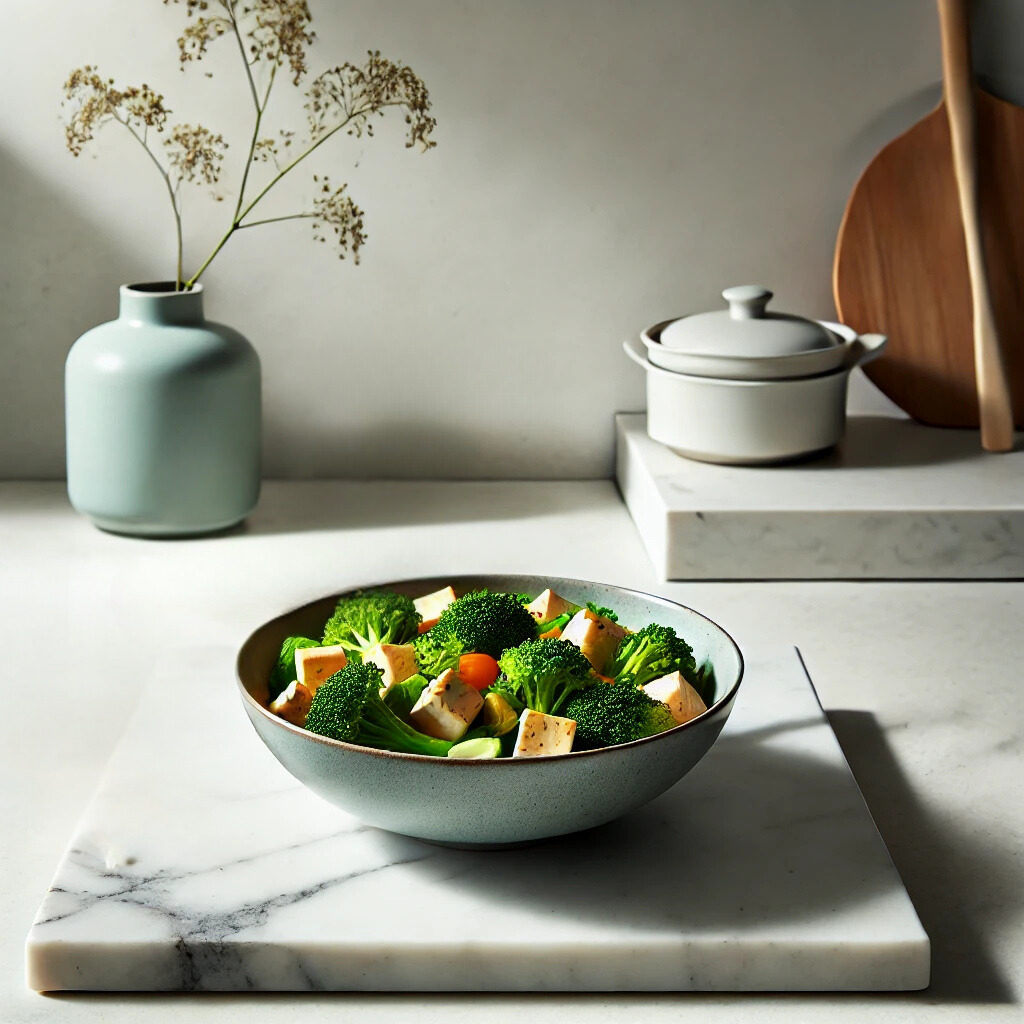
Stir-Fry with Tofu, Broccoli, and Garlic
Quick, flavorful, and endlessly customizable, this stir-fry is a gut-friendly dinner winner. Broccoli is a fiber-rich cruciferous vegetable that promotes regularity and gut health. Tofu provides plant-based protein, and garlic acts as a prebiotic, feeding the beneficial bacteria in your gut. Cook everything in a light sesame oil and soy sauce blend, but be sure not to overcook the garlic to retain its prebiotic properties.
Probiotic Kimchi Fried Rice
For an easy probiotic dinner, kimchi fried rice hits the spot. Use cooked brown rice as the base, add sautéed veggies like carrots and peas, and stir in a generous helping of kimchi just before serving to retain its live cultures. The result is a flavorful, gut-friendly dish packed with probiotics.
Snacks
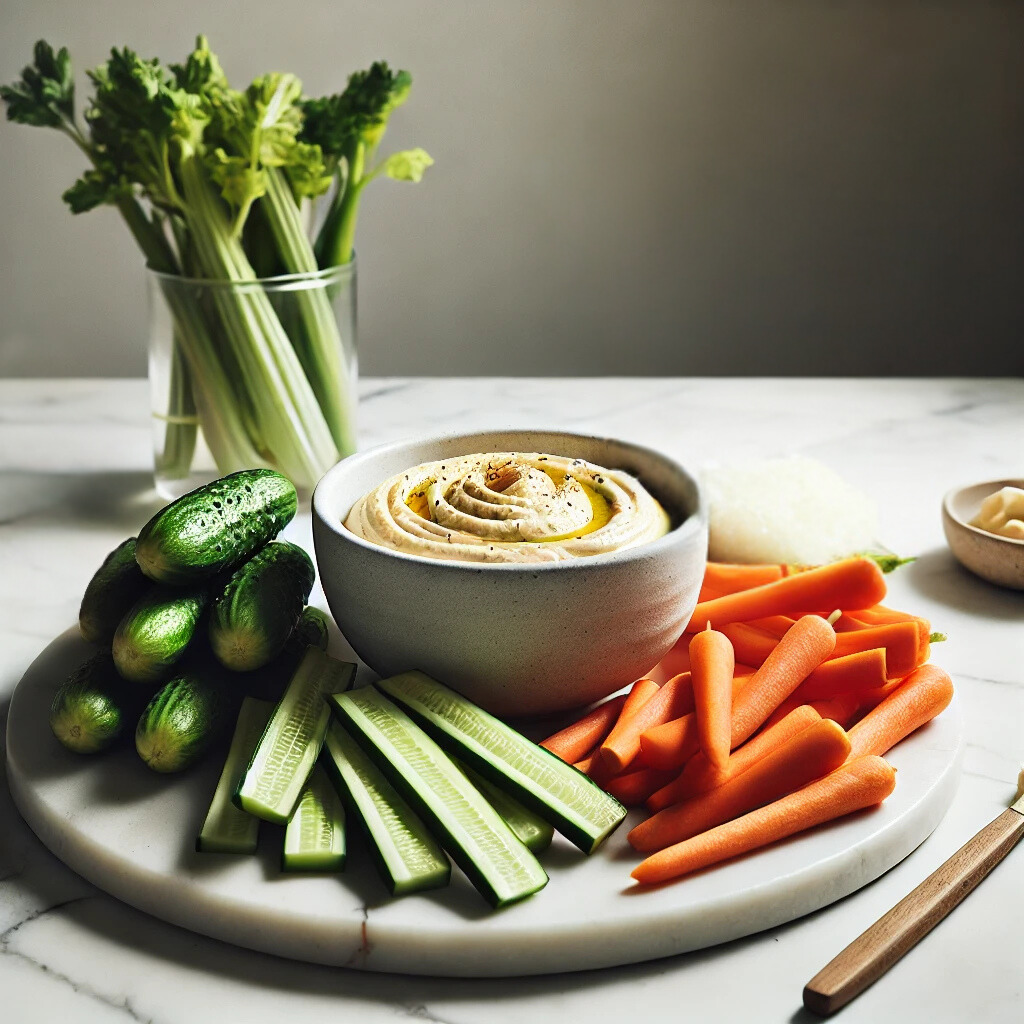
Hummus with Veggie Sticks
A classic for a reason! Hummus, made with chickpeas, is a fiber-rich snack that helps keep your gut bacteria happy. Pair it with crunchy veggie sticks like carrots, celery, or cucumber for extra hydration and prebiotic fiber. This combo is not only satisfying but also easy to prep in advance for busy days.
Roasted Chickpeas
For a snack with a crunch, roasted chickpeas are a go-to. Toss cooked chickpeas with olive oil and your favorite seasonings (try smoked paprika or cumin), then roast in the oven until crispy. Chickpeas are a great source of both fiber and plant-based protein, making them a filling and gut-friendly snack option.
Yogurt Parfaits with Fermented Coconut Yogurt
For a probiotic boost, try layering fermented coconut yogurt with granola, flaxseeds, and fresh fruit. This snack is light, refreshing, and packed with live cultures that support gut health. It’s a great way to indulge your sweet tooth while caring for your microbiome.
Each section includes ideas for prebiotics, probiotics, or both, making them ideal for nurturing your microbiome. They’re also quick, simple, and perfect for meal prep—because eating for gut health should never feel like a chore. Try incorporating one or two of these recipes into your weekly routine and see how much better you feel!
Common Pitfalls and How to Avoid Them
Embarking on a journey to better gut health through plant-based meal prep is exciting, but it’s not without its challenges. Even with the best intentions, it’s easy to fall into a few common traps that can slow your progress. Here are some pitfalls to watch out for and practical tips to keep you on track.
1. Over-Reliance on Processed Foods
Let’s be honest—plant-based doesn’t automatically mean healthy. Pre-packaged plant-based options like vegan burgers, frozen meals, or snacks can be lifesavers in a pinch, but relying on them too much can work against your gut health. These foods often lack fiber and nutrients while being loaded with additives, salt, and unhealthy oils.
How to Avoid It: Focus on whole, fresh ingredients for the majority of your meals. Think lentils instead of canned mock meat, and roasted sweet potatoes instead of frozen fries. If convenience is a concern, batch-cook staples like grains and veggies during your meal prep so you have wholesome options ready to go. And when you do reach for a packaged product, check the ingredient list—shorter is usually better!
2. Not Enough Variety
It’s easy to fall into the habit of prepping the same meals week after week. I’ve been guilty of this too—rice bowls and roasted veggies are my go-to. But here’s the thing: your gut microbiome thrives on diversity. Eating the same foods repeatedly can limit the variety of bacteria in your gut, which is crucial for overall health.
How to Avoid It: Make it a goal to rotate your ingredients every week. If you love grain bowls, try switching from rice to quinoa, farro or bulgur. Add different veggies each week, like zucchini one week and Brussels sprouts the next. Exploring cuisines like Mediterranean, Asian, or Latin American can also introduce new flavors and nutrients. Your microbiome will thank you for the variety!
3. Forgetting Hydration
We’ve all been there—so focused on food that we forget about hydration. But water plays a crucial role in digestion, helping to move fiber through your digestive tract and keeping everything running smoothly. Without enough water, even the most fiber-rich meals can leave you feeling bloated or constipated.

How to Avoid It: Keep a water bottle handy and aim to drink consistently throughout the day. If plain water feels boring, try infusing it with lemon, strawberries, or fresh mint for a refreshing twist. Pairing hydrating foods like celery, bell peppers, or oranges with your meals can also help keep you hydrated without even thinking about it.
Bonus Tips to Stay on Track
- Plan Ahead: Take a few minutes each week to plan your meals and create a grocery list. This helps you stay intentional and avoid last-minute processed food temptations.
- Experiment Often: Keep things exciting by trying new recipes, ingredients, or cooking methods. This not only improves variety but also keeps you motivated.
- Check in with Yourself: Pay attention to how your body feels. If something isn’t working—like bloating or low energy—adjust your meal prep routine to include more hydrating foods or diverse ingredients.
Avoiding these common pitfalls isn’t about being perfect—it’s about making small adjustments that add up over time. By choosing whole foods, embracing variety, and staying hydrated, you’ll set yourself up for long-term success on your gut health journey. Remember, it’s all about progress, not perfection!
How Meal Prepping Can Simplify Gut-Healthy Eating
When it comes to taking care of your gut, healthy meal prepping is like having a personal assistant in your kitchen. It turns what could feel like a daunting task—focusing on eating gut health foods—into a simple, streamlined routine. If you’re new to meal prep or looking for ways to make it more efficient, check out 70 Genius Vegan Meal Prep Tips to Save Time and Eat Healthier for practical ideas that help you prep faster, reduce waste, and make plant-based eating easier.
1. Reduce Decision Fatigue with Ready-to-Go Meals
Ever feel exhausted just trying to figure out what to eat? Decision fatigue is real, and it can lead to less-than-ideal choices like making last-minute takeout orders. By meal prepping in advance, you eliminate the daily question of “What’s for dinner?” Instead, you’ll have a fridge full of ready-to-go, gut-friendly meals waiting for you.
2. Save Time During the Week by Prepping on Sundays
Time is one of the biggest hurdles to healthy eating, but meal prepping gives it back to you in spades. Dedicating a couple of hours on Sunday (or whatever day works for you) allows you to batch-cook grains, chop veggies, and prep proteins for the entire week. It’s a small upfront investment that saves you countless hours—and stress—during your busiest days.
For example, you could cook a big batch of lentils, roast a tray of sweet potatoes, and whip up a tahini dressing all in one session. Store everything in clear, labeled containers, and suddenly, assembling a gut-healthy lunch or dinner takes less than five minutes. You’ll also cut down on mid-week grocery trips and reduce food waste by planning meals more thoughtfully.
3. Build Consistent Habits for Better Digestion and Wellness
Consistency is key when it comes to adding more gut health foods to your diet, and meal prepping makes it easier to stick to healthy habits. When your meals are already prepped, it’s simpler to avoid the pitfalls of processed foods or skipping meals altogether. By prioritizing gut-friendly ingredients like fiber-rich veggies, fermented foods, and whole grains, you’re creating a routine that supports better digestion and overall wellness.
What’s more, having your meals ready encourages mindfulness about what you’re eating. Over time, you’ll find yourself naturally gravitating toward healthier options because they’re already within reach. Meal prepping is more than a convenience—it’s a way to create long-lasting habits that benefit both your gut and your overall health.
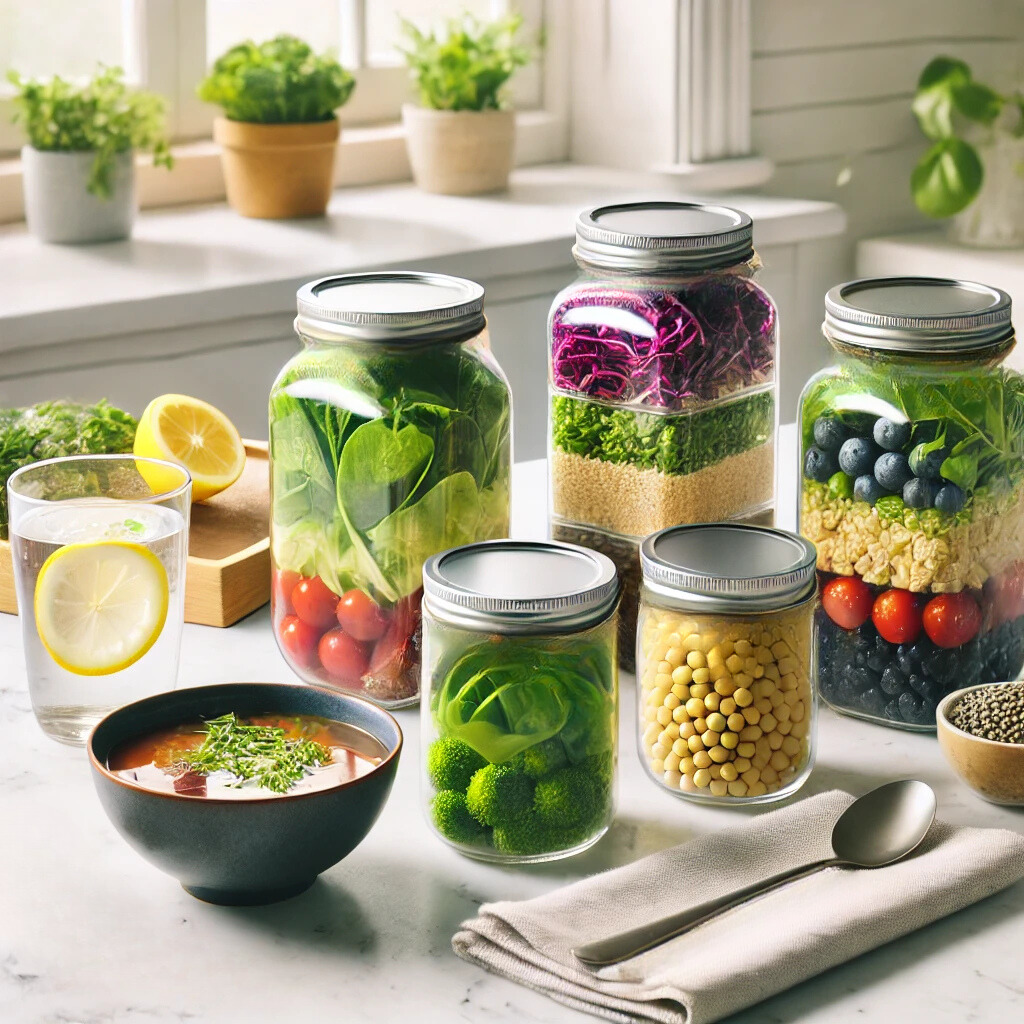
Conclusion: Your Gut, Your Health, Your Choice
Taking care of your gut health doesn’t have to feel overwhelming. By incorporating plant-based foods into your diet, understanding the power of prebiotics and probiotics, and using meal prep to streamline your routine, you’re setting yourself up for success. A healthy gut isn’t just about digestion—it’s about improving your energy, boosting your mood, and enhancing your overall well-being.
Start small. Maybe you try a single recipe, swap out one processed snack for a homemade option, or focus on hydrating more. The key is progress, not perfection. With every thoughtful choice, you’re nurturing your microbiome and investing in your long-term health.
Your journey to better gut health is unique to you. Whether you’re inspired to prep miso veggie soup, experiment with a new probiotic snack, or simply stay consistent with your hydration, every step matters. So, grab those mason jars, fire up your meal prep, and take charge of your health—one gut-friendly meal at a time!
